Languages do not matter, only words do, so let's collect all the words consisting of vowels from all over the world.
I
её (herRU)
eau (waterFR)
U (youNL)
a
It is the order in which it came to me, and it is funny, because it's ieowa (is we in the list? w is not here)
you is also amongst these guys, the U, but then is y vowel? In you itself it is not.
But then if we consider new and knew and view and stew, w is semivowel too, and those those seven vowels in latin will be aeiouwy (the y plays the same role as a in ieoua: raising the tone to raise the mood, I suppose (and w next to y make the claster of semivowels, or a claster of short vowels))
I and U are opposites in both phonetic and semantic aspects
is ей a short form of её? are short vowels short forms of something else?
ея is an obsolete form of её
а (but, and)RU
a (to)FR
я (I)RU
и (and)RU
о (about)RU
ею (by her)RU
у (at)RU
ау
yea (unless y is a consonant)
I think I will have to rearrange this file into languages and their alphabetic orders
междометия:
а (understanding)
e (satisfaction)
i (sheer surprise)
o (surprise)
u (dissatisfaction)
They can also change meaning depending on tone and other characteristics, but e and u being semantically the opposite may say that they are the most basic ones (e can be used for misunderstanding (see russian э) and then it opposes a (which can be screamed and then it is danger (also depending on intonation it can be scream of danger to inform people around, or of mere fear; or the indication of danger you represent to scare the foe away)
Народ группы банты в Китае называется яо.
Я играл с ним в интересную игру под названием Яуо.
Киргизская кибитка носит интересное название ои.
є (is)UA
ау[au] (what russians scream when they're lost in the woods, often translated as hello, hey, ah, ay, etc)
owe (probably ought is owed)
awe (ахуй)
Iowa tells quite a story, it is as if the masons who established the USA knew something: the story is of descending set of iou with lateron added a, and i brings that a at the beginning. Very interesting name of the state aioua
Iowa derives its name from the Ioway people, a Chiwere-speaking Siouan Nation who were once part of the Ho-Chunk Confederation that inhabited the area now corresponding to several Midwest states.
The Ioway tribe is also known as the Báxoje tribe.[3] Their name has been said to come from the Sioux ayuhwa ("sleepy ones."). Early European explorers often adopted the names of tribes from the ethnonyms which other tribes gave them, not understanding that these differed from what the peoples called themselves. Thus, ayuhwa is not an Ioway word. The word Ioway comes from Dakotan ayuxbe via French aiouez.[5] Their autonym (their name for themselves) is Bah-Kho-Je, pronounced [b̥aꜜxodʒɛ] (alternate spellings: pahotcha, pahucha, báxoje,[6]), which translates to "grey snow".[3] Báxoje has been incorrectly translated as "dusted faces" or "dusty nose".[6]
Ouija [wídʒi, The popular belief that the word Ouija comes from the French and German words for yes is a misconception.Misconception or not, such etymology make it sound as wija ўия (then we~ya and вы~я and we ~ я are readings of the board, and in finnish it is ouja(о́уя))]
---- (soon enough I forgot of this separation, and just patched more and more examples of vowel words after the next chapter)
here I will collect words with interesting vowel sequences
литератору (genetivus of литераторъ holding the five vowels in that particular order)
oiseaux (bird in french, holds the five vowels, but the order is a mess (unless it is ascending-descending scale of oieau, and surprisingly it is read with ascending-descending order too, uao this time, and interestingly this is how birds actually fly: first they ascend, then they descend)
EUNOIA is the shortest word in English which has all five vowels.
In rhetoric, eunoia (Ancient Greek: εὔνοιᾰ, romanized: eúnoia, lit. 'well mind; beautiful thinking')[1] is the good will speakers cultivate between themselves and their audiences, a condition of receptivity.[2] In Book VIII of the Nicomachean Ethics, Aristotle uses the term to refer to the kind and benevolent feelings of good will a spouse has which form the basis for the ethical foundation of human life.[3] Cicero translates εὔνοιᾰ with the Latin word benevolentia.[4]
It is also a rarely used medical term referring to a state of normal mental health.[5] Eunoia is the shortest English word containing all five main vowel graphemes.[1]
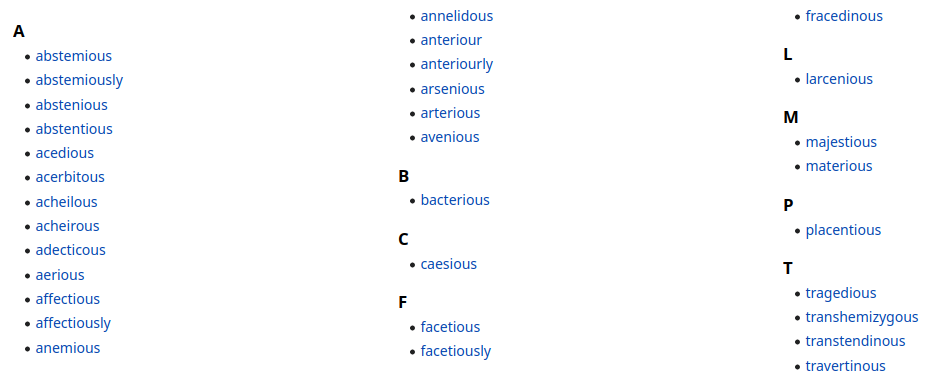
The list is obviously not complete, because it doesn't contain eunoia (but then maybe they don't recognize this word as english, but then the first part of this sentence still stands. Anyway,

for whatever reason, I couldn't find such list for german, but in dutch they even have the term for it: Klinkerstapeling:
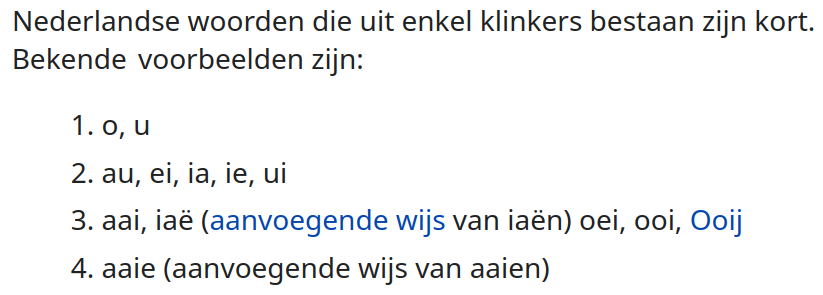
and I kept on looking, and here's something else I want to collect in here:
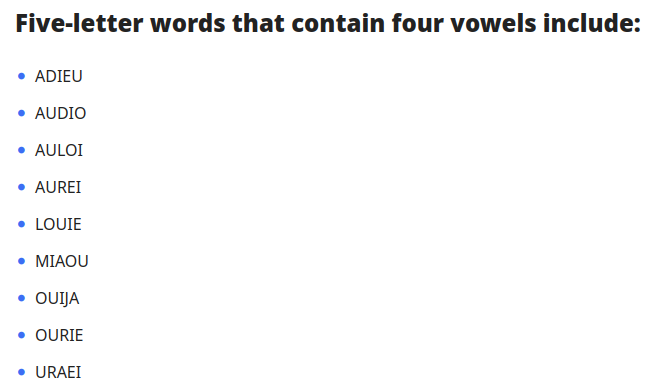
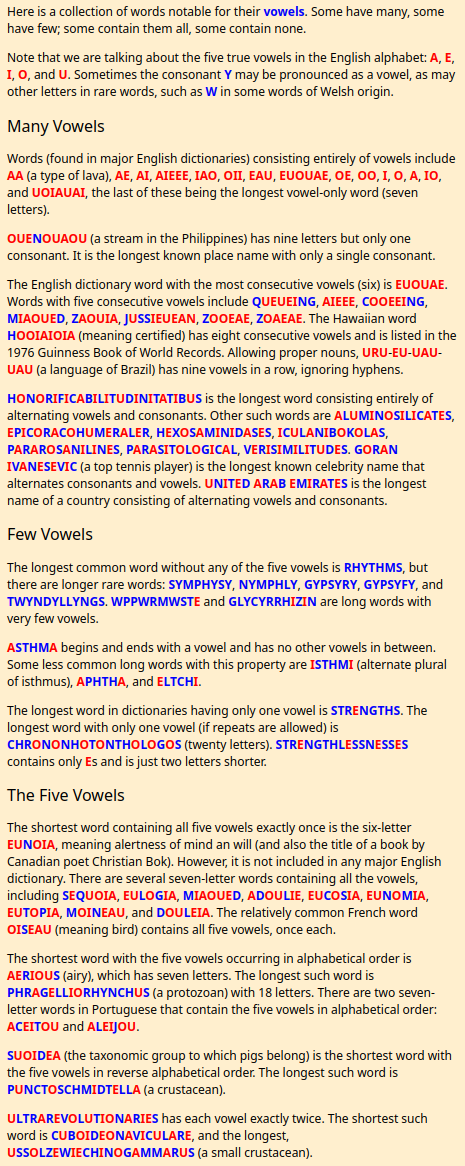

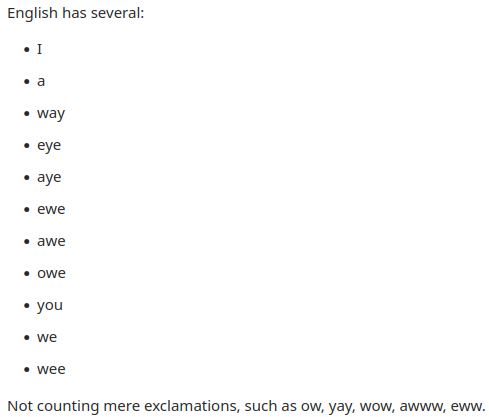
greek ἀεὶ = присно = вечно (устаревшее)
найдено в
Δόξα Πατρὶ καὶ Υἱῷ καὶ Ἁγίῳ Πνεύματι,
καὶ νῦν καὶ ἀεὶ καὶ εἰς τοὺς αἰῶνας τῶν αἰώνων. Ἀμήν.
на которую вывела другое слово идеально подходящее к этому собранию: euouae:
Euouae (/juːˈuːiː/; sometimes spelled Evovae)[1] is an abbreviation used as a musical mnemonic in Latin psalters and other liturgical books of the Roman Rite. It stands for the syllables of the Latin words saeculorum Amen, taken from the Gloria Patri, a Christian doxology that concludes with the phrase in saecula saeculorum. Amen.
and it is some tradition, relating to my idea of vowel speech being divine (I don't remember where I found this idea, but now this)
A similar abbreviation, Aevia (or Aeuia), was used to abbreviate the word Alleluia in medieval Office books. In Venetian and other Italian Office books of the 16th century, an equivalent abbreviation, Hal'a, or Hal'ah, can be substituted for Aevia.
*i*e*o*u*a*
interocular
internodular (intermodular?)
interlocular
interlobular
intergroupal
intercolumnal
intermountain
interglobular
intercommunal
interosculant
intercolumnar
tibeto-burman
*и*е*о*у*а*
видеослужба
видеошутка
видеопушка
*a*e*i*o*u*
acheirous
arterious
arsenious
affectious
abstemious
abstentious
annelidous
caesious
facetious
bacterious
majestious
(and no *а*е*и*о*у* words without other vowels, only something like артериопункция and even more complicated words) https://sanstv.ru/words#template=*%D0%B0*%D0%B5*%D0%B8*%D0%BE*%D1%83*&dict=ru_nouns&sort=desc
My bold guess is in this file a play consisting only of vowels will be born.
and it was born immediately:
СЦЕНА 1
клиент 1
Её! и её!
клиент 2 (друг первого)
Её - я! (показывая на одну из выбранных его другом)
клиент 1
А я?
клиент 2
Её? (предлагая другую)
И? (обращаясь к другой, жестом показывая, чтоб подошла к клиенту 1)
СЦЕНА 2 (идут по корридору в свой номер, их видно со спин, голоса сменяются по мере того как они проходят мимо разных комнат)
- A!
- Yeah!
- ja-ja can be heard from other numbers
- yee-huh from some american, as they pass the corridor to their room
- yo (и наши герои смеются гласно слыша это всё)
СЦЕНА 3 (из-за закрытых дверей, где скрылись наши герои (я зарёкся заниматься порнографией (но не порнография ли это? буквально изображение разврата!!! этически неприемлемая пьеса)))
[some vowel glossolallia impossible to be accuradely put down] (мле makes i↑ mellower)
o!
у!
а-а-а and so on
(and maybe some vocalises on the soundtrack)
are you: A I U (as in the alphabet today)
you are: I U A (as maybe was in the alphabet in the past, when B was the first letter and A was the last)
あう is in dictionaries only as "meet", but was translated as yes in the anime, though "встретимся" would make sense as well, and not knowing japanese well, I can only guess, I guess there are many vowel words in that language. Did I mention aoi for green-blue colour? I think there are many more

ewe[ю](sheep, and probably the root of russian word овца[ovtsa](sheep) and it is literally cognate an homonym of you (where I took it (history of the world part 2(ep.1)) the ewe screamed something similar to ю))
ear[и́а (so I thought, and so they teach, but g.t. tells it's éé)]
eye[а́áй]
いい[ии] good, and here's the instruction to use this word:
air [эя]
some contribution from pi.ai:
air, ere, ore, are, aura, ire, era, oar, aer, eer, oer, era, aria, ere, earl, our, aurochs, aura, rhea, ere, e'er, yea, ur, oer, aurochs, aer, eerie, e'en, leer, eerie, aeon, era, eon, ere, arum, eau, eau, eau, eau, eau, eau.
as usual in the early 2024, it gives good variants with halluciantions, so even if I take that it sees l and r as vowels in the way sanskrit considers them vowel (or, after all, I fed it air as an example of word with consonant letters but without consonant sounds) it still doesn't explain n of e'en and chs of aurochs which it used twice (and it repeats itself like mad, especially that eau, which is actually french, we discussed it before or after that, she though it has w sound at the end, it definitely read it in english manner, the technology is still rather raw, but already pretty impressive)
It made me thing of "or" and french "et"
I think I should place all examples into quotation marks to look them up if I already have them in the collection.
A contribution from Joannes Richter:
Most modern variants of Danish language distinguish 12 long vowels, 13 short vowels, and two central vowels, /ə/ and /ɐ/, which only occur in unstressed syllables. This gives a total of 27 different vowel phonemes85. The sound system of Danish is unusual, particularly in its large vowel inventory. The full vowel list is a, e, i, o, u, y, æ, ø, å
In the Western Danish dialect Jutlandish, it is possible to construct a complete sentence using only all-vowel single-letter words:
a e u o æ ø i æ å, e a! (depending on subdialect): Word-for-word meaning: I am out on the island in the river, am I!
Real Jutlandish is unintelligible for most people from the rest of Denmark, and therefore some linguists see Jutlandish as a separate language. Unfortunately, Jutlandish is disappearing in many parts, being replaced by standard Danish.
A Swedish example in a dialect called "Värmländska" by Swedish poet Gustaf Fröding is the sentence:
"Å i åa ä e ö" which means "And in the creek there is an island"86.
and here he delivers more:
In Old-French the word may have been composed by containing (pure) vowels. These compositions may also be found in the words for eternity (Greek ἀεί) and for theonyms (especially IEHOVA). The 5-letter word for water is: iaoue (Guernsey).
Guernsey is a remark from wiktionary, where he
probably took it.
Greek word for Eve is Εὕα
Irish: aoi m (genitive singular aoi, nominative plural aíonna)
guest, lodger, knowledgeable person (and a couple of completely different meanings)
There are so many vowel words across languages, that I'm confused if I should do it by hand or if I should use some good program to sort them all out for me. I wish I could, until I do we have to do it by hand, duh.
ευαι:
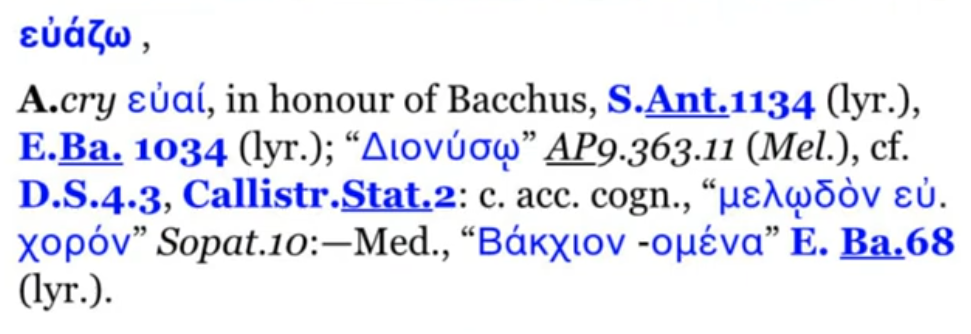
ευαι: ευαζω ~ ευαιω (𐌆~I) but then here I step outside of the skope of this work, which should be a collection of vowel words. And ευαι is a good example, but ευαζω allows Иешуа to join. а там и Яша, но что делать с примерами без гласных, но в которых
εὐαί is read by g.t. as eve (эвэ́) and wiktionary agrees: IPA(key): /eu̯.ǎi̯/ → /eˈβɛ/ → /eˈve/ a cry of joy
Εύη • (Évi) f Eve a female given name, Evi, variant of Εύα (Éva), equivalent to English Eve
Εύα • (Éva) f Eve a female given name, Eva, equivalent to English Eve
ὐ
ύψιλον
The name of the letter was originally just "υ" (y; also called hy, hence "hyoid", meaning "shaped like the letter υ"), but the name changed to "υ ψιλόν" u psilon 'plain υ' to distinguish it from οι, which had come to have the same [y] pronunciation
ψηλά высокий (греческий, что с тобой не так. Должен я задать эти вопросы кому-то..
блин, это случилось, я начал греческий учить
а оно ещё закрученней:ψιλο- • (psilo-), ψιλό-
prefix denoting that the second combining form...
is very thin
ψιλο- (psilo-) + κόβω (kóvo, “I cut”) → ψιλοκόβω (psilokóvo, “I cut thinly”)
ψιλο- (psilo-) + φλούδα f (floúda, “rind”) → ψιλόφλουδος (psilófloudos, “with thin rind”) (especially for fruit)
is created after meticulous process
ψιλο- (psilo-) + δουλειά f (douleiá, “work”) → ψιλοδουλειά (psilodouleiá)
is not important, not serious
ψιλο- (psilo-) + πράγματα n pl (prágmata, “things”) → ψιλοπράγματα (psiloprágmata, “unimportant things”)
"οι, which had come to have the same [y] pronunciation" at first confused, but here's the explanation:
In early Attic Greek (6th century BCE), it was pronounced [u] (a close back rounded vowel like the English "long o͞o").[8][9] In Classical Greek, it was pronounced [y] (a close front rounded vowel), at least until 1030.[10] In Modern Greek, it is pronounced [i]; in the digraphs αυ and ευ, as [f] or [v]; and in the digraph [ου] as [u]. In ancient Greek, it occurred in both long and short versions, but Modern Greek does not have a length distinction.
As an initial letter in Classical Greek, it always carried the rough breathing (equivalent to h) as reflected in the many Greek-derived English words, such as those that begin with hyper- and hypo-. This rough breathing was derived from an older pronunciation that used a sibilant instead; this sibilant was not lost in Latin, giving rise to such cognates as super- (for hyper-) and sub- (for hypo-).
I heard earlier, that greeks have three i's: η ι υ
and it made me wonder if latin Y was borrowed from the Modern Greek? Was it influenced by modern greek? is it ю in russian? "u psilon 'plain υ' to distinguish it from οι, which had come to have the same [y] pronunciation" οι[y] ~ іо~ю, but what am I even doing here? pondering)
some brits pronounce water [woa] as uoa, similar to the vowel word eau, yet, rather, reversed.
aoue in water in Lorraine and eau in water in French)
Aiouea род кустарников и деревьев семейства Лавровые (Lauraceae)
Aiouea — неотропический род, распространённый от юга Мексики до Парагвая, через Центральную Америку, Колумбию, Венесуэлу, Тринидад и Тобаго, Гайану, Суринам, Французскую Гвиану, Эквадор, Перу и Бразилию[2].
.
